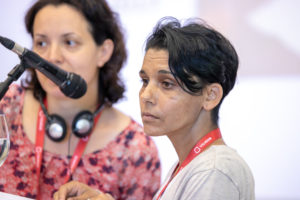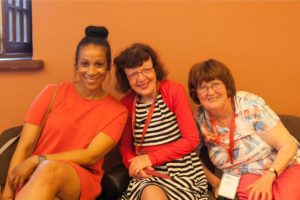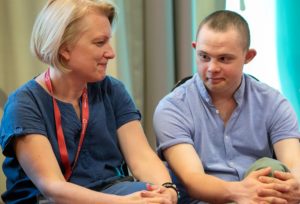Inclusion Europe’s Secretary-General José Smits gave a summary of “Europe in Action” at the end of the conference. Here you can read the full text of her speech, published in our blog.

The theme of this conference was “Everyone has the right to be independent and be included”. That is not an easy theme.
At this conference we heard examples of countries where the number of people living in institutions increases. We heard about large numbers of children with complex needs who are not allowed to go to school.
We heard that many people with intellectual disabilities are not allowed to vote or to marry, to have work and an income. Many are not allowed to make any decision in their life.
In richer countries social services are offered within the community but not well tailored to individual needs. Often people with complex needs are left out of social services. In poorer countries there is a lack of support and families will have to work even harder in trying to organise a good life.
Having a signed Convention (the UN Convention on the Rights of Persons with Disabilities, CRPD) is not enough to change policy and practice in many countries. Jonas Ruškus told us that many governments “do not yet understand” what the convention tells them to do.
Whether one has a disability or not, feelings are the same for everyone
We also heard many people tell us about examples of positive change. There are initiatives by self-advocates who become trainers, who are consulted by governments, who become peer supporters and UN ambassadors. They make their voices heard in their societies.
We heard about mothers (Maia from Georgia and Nurgul from Kyrgystan) who find that there are no services in the community for their children and who start to organise themselves. They start self-help groups, kindergartens and social services, even companies to offer employment for their children with disabilities.
We heard about good practices in organising support circles, employment for people with disabilities, better education and supported decision-making.
We heard personal stories of people who managed to leave an institution, like Elisabeta Moldovan, Annemarie Dufie and Kathleen McTeigue. They told us that friends helped them. They showed us that they can make these very important decisions to build their own lives and fight for their freedom.

Catherine Carter taught us in her workshop how it feels like being defeated by someone else who take decisions for you. It happens to all of us sometimes. And she showed us how good if feels when one can make decisions. Whether one has a disability or not, feelings are the same for everyone.
We want to go from establishing good practices to finding ways to change the system
Dainius Puras, one of the founders of Viltis, summed up 30 years of the organisation’s work with a sentence that rings true for our entire movement: The work is a “combination of achievements, failures, challenges and opportunities.”
He explained that parents and self-advocates can quickly learn what is needed to build community support and provide better services for people with disabilities.
But they also often quickly learn that counterforces are strong. Doctors and care providers frequently work with an outdated medical model: The issue is not that they do not fully understand what the CRPD is about. The reason is rather that they refuse to give up control over the billions of euros of profits made in the care industry.
Puras called this a systemic failure. One thing I take from this conference is that we want to go from establishing good practices to finding ways to change the system.
We can work on a society that is inclusive, tolerant, vibrant and healthy
It means we have to think about a strategy on a lager scale and what it is exactly that hinders inclusion. We live in societies that emphasize competitiveness in schools and on the labour maket, and economic growth instead of individual welfare. Populist movements are on the rise – I think because many people feel they are in danger of not being able to achieve economic well-being.
The disability movement could take the lead and show that we can work on a society that is inclusive, tolerant, vibrant and healthy for all, if we respect the human rights of everyone. We can seek ties to strengthen the “coalition of the willing”, as Puras called it. It would not be about seeking help. It would be about sharing parents’ and self-advocates’ experiences. We have so much to offer.

We went out on the streets to connect with people here in Vilnius
With that comes the realisation that it is very important to be visible and to have the voice of people with disabilities heard. We do a better job as a movement for change when we actively work on visibility and involvement of self-advocates on all levels.
Jonas Ruškus told us that his experience in spending time with people with disabilities changed him as a person. Inclusion Europe changes lobbying practice in Brussels and in Geneva by involving self-advocates and parents in every meeting, in every presentation and in every report and letter to politicians and bureaucrats. These person-to-person contacts really change the views of politicians and bureaucrats.
During this conference we focused more on self advocates with complex needs. I know we have to keep on working hard on being more accessible for everyone at our conferences, but we had some very good examples. For instance, Manuel made us listen very attentively to his story, and told us what he wants to do in his life.
During this conference we went out on the streets to connect with people here in Vilnius and to show them who we are and why we gather here. It is very important to be visible.
The aim is no less than to change society
Now, what to take from this conference for our future work? We go home and fall back to our daily routines. We are encouraged, inspired but we might also feel desperate. The aim is no less than to change society.
It would help to think in small steps – like Plena Inclusión taught us in their workshop. We can apply the method we use when thinking about changing the life of individuals we know. We would make a a personal plan for the future and set up a circle of support. My suggestion would be to use that technique.
So, take a moment right now to think about the next small step you want to take. Then make a plan in your head. Then decide who you will ask to help you with that plan. Look around you right now and think who you met at this conference and who you would like to help you. Ask for their email address and send an email later with a question. Also try to think and talk about how to make use of the CRPD and EU legislation and initiatives.

Tell us what you are doing, ask questions, exchange useful strategies and achievements
When you return home, find a way to stay in contact with Inclusion Europe. Tell us what you are doing, ask questions, exchange useful strategies and achievements, write blogs, make vlogs, pick up the phone and offer or ask us for help, organise meetings and invite us to join in your activities in some way. Let’s use social media to stay in touch with each other. Language might be a problem. We have so many languages. But Google is good for rough translation – that helps and sometimes gives a good laugh!
I loved being in the company of a group of very diverse and crazy Europeans: We may have different languages and cultures, but we share a vision on how to work on a better society for all. I hope we keep in touch. I hope to see you next year to share again what we have done.





